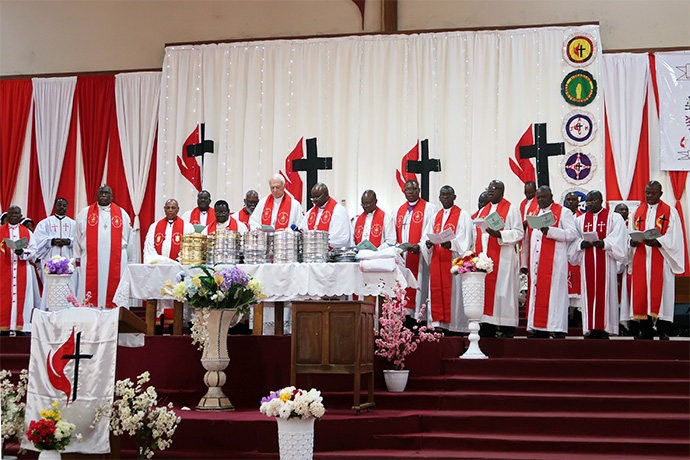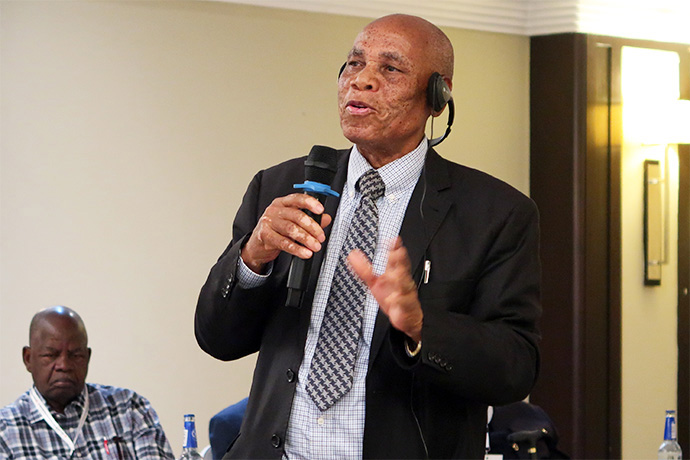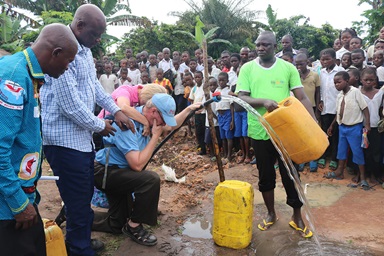Key points:
- Discussions at the Sept. 2-7 meeting included the General Conference petition on regionalization, Christian marriage and the way forward for the church in Africa.
- Most African bishops signed a statement affirming their intention to stay in The United Methodist Church.
- Bishops were hopeful of getting two or three new episcopal areas at the 2024 General Conference and discussed their possible placement.
Conversations on regionalization, possible new episcopal areas and the Christian definition of marriage dominated the United Methodist Africa Colleges of Bishops learning retreat, held Sept. 2-7 in Lubumbashi, the Democratic Republic of Congo’s second-largest city.
The meeting was attended by 11 active bishops from the African continent, as well as by Sierra Leone Conference interim Bishop Warner Brown, retired Bishops David Yemba and Ntambo Nkulu Ntanda, Bishop Gregory V. Palmer of the West Ohio Conference and Council of Bishops president Thomas J. Bickerton.
“We discussed the future of The United Methodist Church in a wider context and had conversations on regionalization,” said Bishop Eben K. Nhiwatiwa of the Zimbabwe Episcopal Area who is the president of the three African colleges.

Regionalization plans foresee a new approach to governing The United Methodist Church, replacing the current central conferences and designating the entire U.S. as a regional conference.
Advocates for regionalization in The United Methodist Church say it would give Africa, Europe, the Philippines and the U.S. equal standing in church decision-making. They also say it would help with missional effectiveness, allowing for more emphasis on the local context.
Regionalization legislation will be before the United Methodist General Conference, the denomination’s law-making assembly, when it meets in Charlotte, North Carolina, April 23-May 3, 2024.
“We received some ideas about regionalization through the Connectional Table and we believe regionalism was probably with us for some time when we look at the existing central conferences, which were a way of recognizing different regions of the world,” Nhiwatiwa said.
He explained that to him regionalization means contextualization mainly — and, again, is not new.
“The Book of Discipline states our church has to abide by the laws of the country, which is clear recognition that we don’t operate in the same environment,” Nhiwatiwa said.
Nhiwatiwa noted that any plan for further regionalization must be well drafted and detailed to allow for successful adaptation in a particular area.

The continent’s episcopal leaders also took time to discuss possible new episcopal areas and placement of leaders following the 2016 General Conference approval of a plan to add five new bishops in Africa.
Since that decision, The United Methodist Church has faced increasing financial challenges, threatening any near-term adding of five new slots.
“With the developments which everyone is noticing in the church, such as reduction in membership and numbers of conferences, five bishops are not a possibility where we are right now,” Nhiwatiwa said. “So, we are working with two possible scenarios. We are saying maybe we may get two or maybe we get three. … If we get two or three in the whole of Africa, where will they go?”
The bishops also discussed possible dates for the 2024 central conferences to be held after the General Conference in Charlotte.
“There was an idea that probably we can meet in the same week of the chosen month. We don’t want our conferences to be too far apart. It has to be within two weeks,” Nhiwatiwa said.
The meeting came as local church disaffiliations in the U.S. — caused, in part, by decades-long conflict over how accepting to be of homosexuality — continue to occur. So does speculation about how much loyalty to the denomination exists among African United Methodists, including bishops.
“Assessing what I am getting from the meeting, a good number among the bishops seem to want to encourage our people to stay in The United Methodist Church,” Nhiwatiwa said. “I may be mistaken, but that’s what I am hearing. It doesn’t mean we are 100 percent. We may not be 100 percent but that sentiment is there.”
A statement issued at the close of the meeting and signed by 12 of the African bishops in attendance affirmed the episcopal leaders’ wish to stay in The United Methodist Church.
“Notwithstanding the differences in our UMC regarding the issue of human sexuality, especially with our stance of traditional and biblical view of marriage, we categorically state that we do not plan to leave The United Methodist Church and will continue to be shepherds of God’s flock in this worldwide denomination,” said the bishops.
Bishops John Wesley Yohanna of Nigeria, Samuel J. Quire Jr. of Liberia and Kasap Owan of South Congo and Zambia did not support the statement.
Yohanna told UM News he did not sign “because the major unexpressed rationale behind (the) regionalization plan is to allow same-sex marriage in some regions, which I say no (to).”
Kasap also answered a UM News query about why he didn’t sign the statement:
“As the host(s) of this meeting, we refuse to endorse a statement that contradicts the authority of the Bible and the Book of Discipline. I asked that the declaration clearly reiterate this idea and that it remains known that homosexuality is a sin. This is the conviction of African Methodists.”
Kasap added: “We should not waste the time to make a statement on those who have already left or those who intend to leave, because in Africa no bishop has left the UMC or expressed his (or her) intention to leave. Regarding regionalization, the idea is still confusing.”
Palmer offered his assessment of the meeting.
“I feel conversations have been fruitful and the fellowship and camaraderie and the worship has been exceptional. And I feel we have been able to move more deeply into some more challenging issues facing the whole United Methodist Church and facing the UMC in Africa,” he said.
Palmer added: “It was valuable for me to come to Africa where they feel at home among themselves, literally on the land of their birth. So many people in our church are always making the big trip to come to the U.S. so it’s important for those tables to be turned whether it’s to the Philippines or Africa so that we are all moving towards one another and no one is coming only in one direction. There was a freedom that everybody felt in this context and among all of us together.”
On decolonization and moving from a missionary church to a missional church, Palmer said: “I feel the movement, I see more and more commitment from parties around the church that we move from that mindset and out of that rut and pattern of behavior. It will not happen overnight. It takes a long time for any of us to be free from our colonized or colonizing behaviors. We are all the inheritors of that which has come before us. There are habits and patterns that we do not even realize that we are doing them because of colonization — until they are pointed out to us.”
The 2023 Africa Colleges of Bishops learning retreat opened with a worship service at the Memorial du Centenaire Cathedral that was attended by over 3,000 people including government leaders and members of other denominations.
In his sermon, Bishop Bickerton urged those in attendance to love one another and build on the foundation of love. It is the only thing that we can hold on to when all that we have built on as a life has crumbled, he said.
Subscribe to our
e-newsletter
“The church’s greatest success depends upon only one thing: mutual love created and shared within the community of faith and beyond into meaningful relationships throughout the world based on the foundation of love. The quality of our love for one another among Christians makes the church an effective witness for the gospel because it is what the human spirit longs for, dreams of and desires,” said Bickerton.
Judi Kenaston of the Connectional Table had the opportunity to address the episcopal leaders and shed some light on the General Conference petition on regionalization.
She said there had been proposals for regionalization since the 1930s and it is not true that proposed legislation would allow different definitions of marriage.
“The regions will only be able to adapt the parts of the Discipline that are adaptable,” Kenaston said. “However, (regionalization) might allow a region to determine the way the church in its region can minister to people as they are affected by the laws of the region.”
Bishops Yemba and Brown led the discussion on the Christian definition of marriage in an African context.
Yemba quoted Zimbabwean theologian the Rev. David Bishau: “The definition derived from the Bible of marriage as a union between a man and a woman whose primary goal is to continue God’s creative acts through reproduction.”
Bishop Daniel Wandabula of East Africa said in his episcopal area there were different types of marriages (traditional, civil, religious in general and Christian), which had three common characteristics: marriage is an institution, a covenant between a man and a woman and is usually instituted before witnesses both physical and spiritual.
Kasap said the five annual conferences in his area define marriage as a union between a man and a woman.
“The house of God is a house of prayer, order and peace. It is therefore our responsibility as bishops to bring order in the house of God,” he said, referring to teaching about Christian marriage.
The bishops’ gathering was notable, in part, because of Bickerton’s presence. Nhiwatiwa was asked to comment on what it was like to have the Council of Bishops president present for discussions.
“The COB president has his personality of being open, he has that gift. He is a person who wants to avail himself to the different units of the church while he is leading as the president of the council,” he said.
Last year, Bickerton joined the African leaders virtually when they held their meeting at Africa University in Zimbabwe.
“He was here (this time) in person. It’s not easy, but he did that,” Nhiwatiwa said. “We take that as a way that the president and the council and maybe the whole church are recognizing that Africa is a critical component of the church and that it brings something very healthy in the life of our denomination.”
Chikwanah is a correspondent for UM News based in Harare, Zimbabwe.
News media contact: Julie Dwyer at (615) 742-5470 or [email protected]. To read more United Methodist news, subscribe to the free Daily or Weekly Digests.




